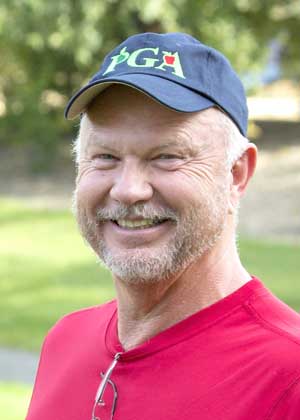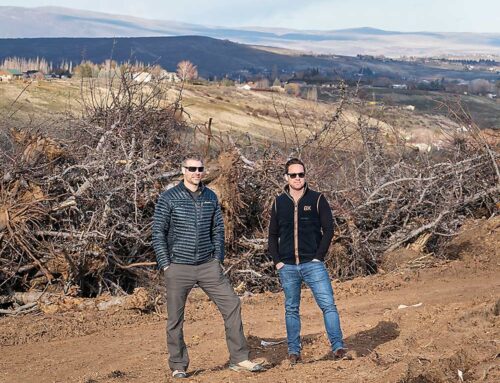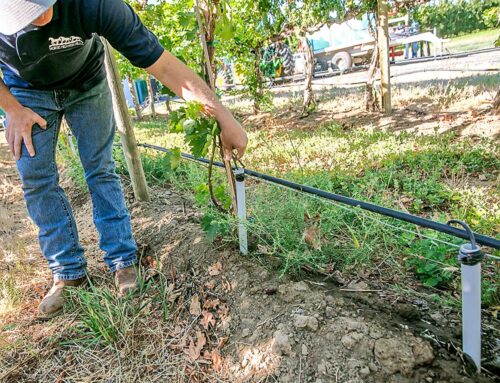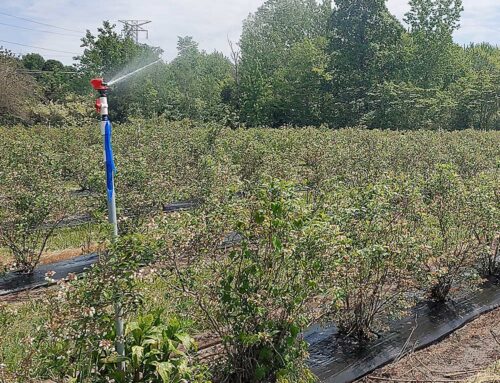
Win Cowgill
The NC-140 Regional Research Project focuses on the improvement of rootstocks for tree fruit crops in North America.
Our mantra: improving economic and environmental sustainability in tree fruit production through changes in rootstock use.
Most growers think of apple rootstocks when they see references to NC-140, and the project did start with apples.
The North Central Project 140 (NC-140) was established in the late 1970s to facilitate evaluation of apple rootstocks and interstem trees in the U.S.
The first multi-state apple trial was planted in 1980, and with cooperators from more than 20 states, four Canadian provinces and one Mexican state, NC-140 has played a major role in the rapid adoption of intensive apple orchard systems in North America.
Many note that dwarfing apple rootstocks tested by NC-140 with precocity, disease resistance and some insect resistance, have transformed the apple industry worldwide, though the project was expanded over the years to include trials with peaches, cherries, pears and plums.
Here, I provide an update on the peach rootstock trials.
Peaches
Tom Callahan, director of sales for Adams County Nursery in Aspers, Pennsylvania, has often noted that the peach industry desperately needs dwarfing peach rootstocks that are compatible for the northeastern United States and that are thoroughly tested before being released.
NC-140 has evaluated peach rootstocks for over 30 years, although peach rootstock development lags behind that of apple to identify dwarfing selections.
The primary goal of NC-140 peach rootstock evaluations has been to find peach rootstocks with dwarfing characteristics combined with disease resistance and greater longevity, particularly under some of the disease pressures found in major peach-growing regions of the U.S.
Over the years, peach tree short life (PTSL, also known as bacterial canker complex) and Armillaria root rot (ARR) have been the most common causes of premature mortality among peaches in the Southeastern U.S. PTSL is responsible for more than $6 million in lifetime production losses annually in South Carolina alone.
Breeders have made good strides in developing disease resistance rootstocks but are just beginning to identify some possible hybrid rootstocks with the dwarfing characteristics so cherished in apple.
Several standard varieties that produce full-size trees serve as the controls in these trials: Guardian (BY520-9), which was released in 1993 by USDA-ART and Clemson researchers and has been a standard in the southeastern U.S., and Lovell and Bailey, which are the most common seedling rootstocks used for peaches in the northeastern U.S.
Dr. Greg Reighard, Clemson University, has led all of our NC-140 peach rootstock trials to date.
2009 trial
Researchers planted 18 Prunus rootstocks with Redhaven peach at 16 locations in 2009, with Lovell and Guardian as the controls.
Some of the new rootstocks in the NC-140 trials have been clonally propagated and included genetics of peach and other Prunus species.
Reighard, the trial leader, reported the following summary for all locations:
Prunus persica rootstocks had the highest survival, with five of the six cultivars having 93 percent or greater survival across all sites. Root suckering was only a problem with P. americana, which had excessive root sprouts under the trees. Largest trees were three Prunus x almond hybrids and Guardian.
Fruit size varied with location and crop load (i.e., some rootstocks had few fruit). KV010127 produced the largest fruit and Controller 5 and Mirobac (aka Replantpac) the smallest fruit across all sites.
Cumulative yields were generally highest with the peach rootstocks, with Guardian leading the way.
Lowest yields were from plum hybrids and species. Cumulative yield efficiency was highest on the nonpeach rootstocks, including many of the plum hybrids or species.
However, many of these rootstocks produced trees much smaller than the peach and almond hybrid cultivars.
These data suggest there were no demonstrated advantages to using clonal interspecific Prunus hybrids for peach production under current cultural practices.”
2017 NC-140 Peach Systems Rootstock Trial
What’s clear from the research so far is that peach rootstocks perform very differently throughout the U.S., and needs vary as well. The Southeast needs disease resistance, while the Northeast and Michigan require cold hardiness. And everyone needs dwarfing rootstocks that are well tested and vetted.
To continue this effort, a new NC-140 research trial got underway in spring 2017, with seven rootstock varieties planted at 10 locations in North America — nine states and one Canadian province. They are:
—Controller 6 (HBOK 27), Controller 7 (HBOK 32) and Controller 8 (HBOK10), all from the University of California, Davis.
—Rootpac 20 (Nano Pac) and Rootpac 40 (Densi Pac), both from Agromillora Catalana, Spain.
—MP-29 from breeder Tom Beckman, U.S. Department of Agriculture, Byron, Georgia. MP-29 is a clonal plum-peach interspecific hybrid that was released in 2011. It is resistant to PTSL, ARR and root-knot nematodes.
The cultivar Cresthaven was used, and rootstocks Guardian and Lovell were planted as controls. All trees were planted at a spacing of 5.9 feet by 18 feet with a perpendicular-V as the training system. Evaluating these more dwarfing rootstocks in a closer-spaced system will allow us to better evaluate them in a more modern, higher-density production system.
States included in the 2017 trial include Colorado, Georgia, Alabama, South Carolina, North Carolina, Pennsylvania, New York, Utah, Michigan and California.
For more information on the 2009 trial and how specific rootstocks performed in specific locations, NC-140 or publications, visit www.nc140.org:8000/Login (anyone can log in as a guest using the anonymous login).
The NC-140 website is maintained by Jon Clements of the University of Massachusetts and Win Cowgill. •
Win Cowgill is professor emeritus at Rutgers University and CEO of Win Enterprises International, LLC, a pomology and horticultural consulting group working with commercial growers and nurseries. He can be reached at wincowgill@mac.com.
Sources:
MA, SC, NC, UT- 2015 NC140 State Reports @ http://nc140.org/
NC-140 multi-state research project: Improving economic and environmental sustainability in tree-fruit production through changes in rootstock use. Winfred P. Cowgill, Jr., Wesley R. Autio, Emily E. Hoover, Richard P. Marini, and Paul A. Domoto 2017. J Am Pom Soc. (APS) 71:34-46. http://www.pubhort.org/aps/71/v71_n1_a5.htm
Performance of Prunus rootstocks in the 2001 NC-140 peach trial. Reighard, G.L., Beckman, T.G., Belding, R., Black, B.L., Cline, J., Cowgill, W., Godin, R., Johnson, R.S., Kamas, J., Kaps, M., Larsen, H., Lindstrom, T., Ouellette, D., Pokharel, R., Stein, L., Taylor, K., Walsh, C.S., Ward, D. and Whiting, M.D. (2011). Acta Hortic. 903, 463-468. DOI: 10.17660/ActaHortic.2011.903.63
Evaluating Potential Peach Rootstocks in the NC-140 Trial Cling Peach Report 2013-14, http://calclingpeach.com/peach-research/ Johnson, Day, Dejong, Beckman, T.G., Okie, W.R., Nyczepir, A.P., Reighard, G.L., Zehr, E.I. and Newall, W.C. 1997.
History, Current Status and Future Potential of Guardian (BY 520-9) Peach Rootstock. Acta Hort. (ISHS) 451:251-258 http://www.actahort.org/books/451/451_27.htm
Evaluation of Peach Rootstocks: 2009 NC-140 Peach Rootstock Trial through Seven Growing Seasons. Wesley R. Autio, James S. Krupa, Jon M. Clements, and Winfred P. Cowgill, Jr. Fruit Notes, Volume 81, Summer 2016. http://www.umassfruitnotes.com/v81n3/wxyzCover813.html
Evaluating Potential Peach Rootstocks in the NC-140 Trial. Cling Peach Report 2013-14, http://calclingpeach.com/peach-research/ Johnson, Day, Dejong.
Peach Rootstock Trials: A 2014 Update. A report to the State Horticultural Association of Pennsylvania, 2014 Research Grant. Jim Schupp. http://shaponline.org/






Thank you Win for the excellent update.